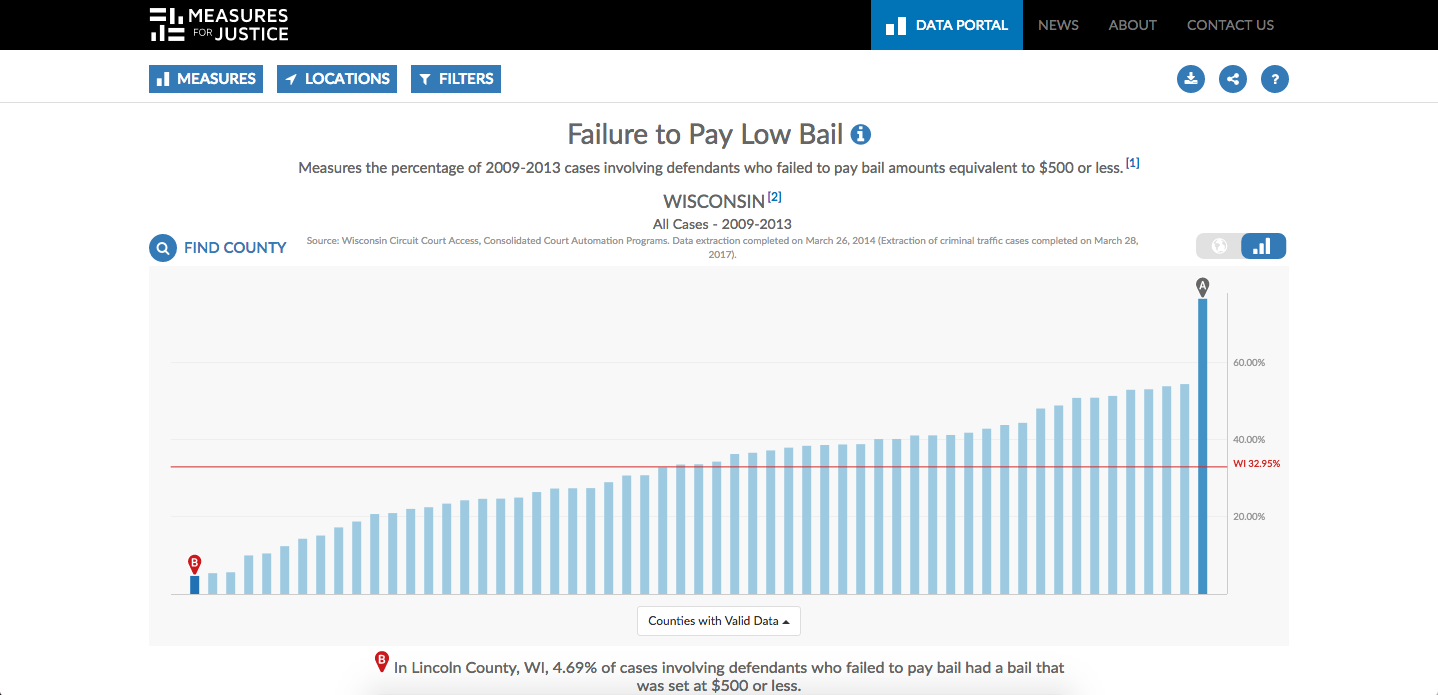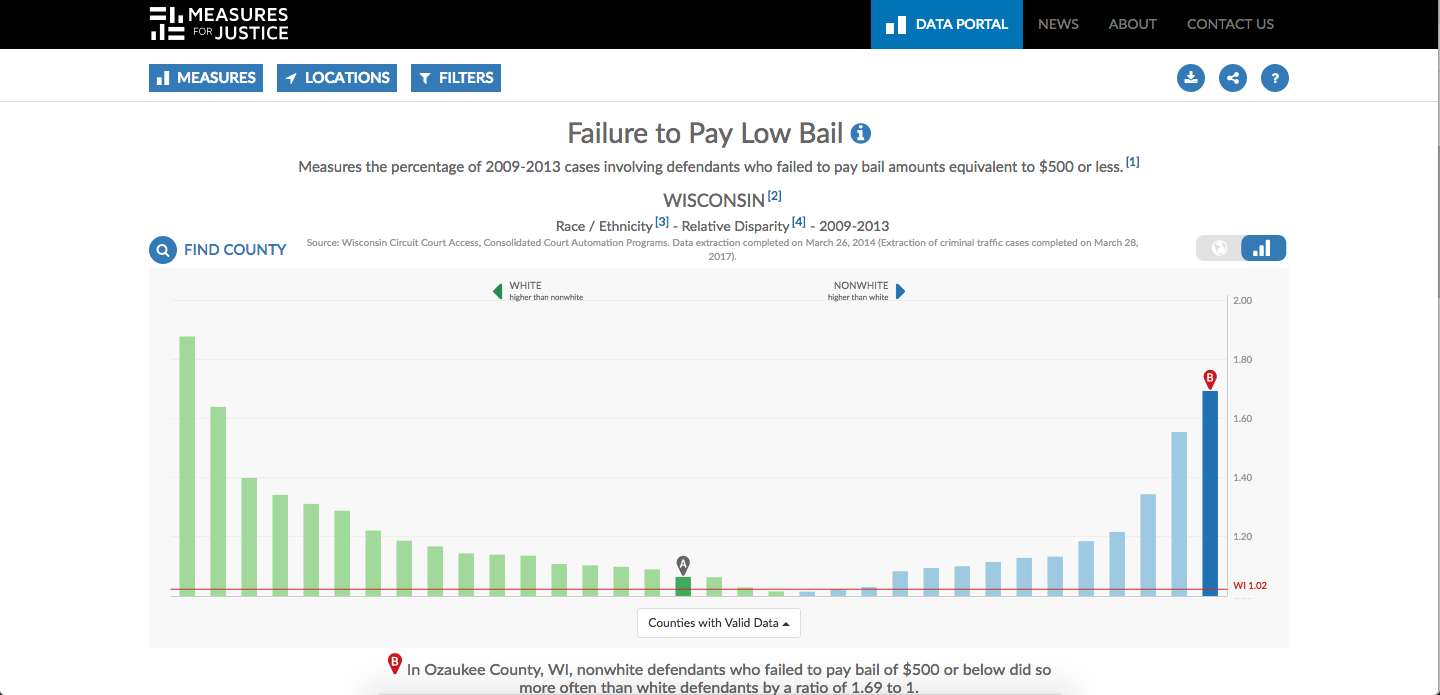Connecting state and local government leaders
With court data hard to come by, Measures for Justice is working with counties in six states to provide transparency at every step in the process—from arrest to post-resolution.
A new criminal justice data portal analyzing and comparing cases in counties across six states launched Tuesday, offering local governments greater transparency with which to make informed reforms.
Unlike with education and health care, measures evaluating local justice systems aren’t as good because the data is harder to come by.
A Rochester, New York-based nonpartisan nonprofit group, Measures for Justice, has now made crime and arrest, pretrial, case resolution, and post-resolution data from Florida, North Carolina, Washington, Wisconsin, Utah, and Pennsylvania publicly available for free.
“Transparency is so key to progress in any civic institution,” Amy Bach, Measures for Justice’s executive director, told Route Fifty in an interview. “And people have a right to know how their system is designed and to see how they’re working.”
In 2009, Bach published a book, “Ordinary Justice: How America Holds Court,” in which she argues citizens are turning a blind eye to criminal justice because they lack comparative data.
By 2011, Measures for Justice had obtained some seed funding from a U.S. Department of Justice grant from the Bureau of Justice Statistics to have experienced criminologists create some baseline measures tested by hundreds of people. Beginning in Milwaukee, Wisconsin, the nonprofit cleaned and coded court data.
Measures vary from state to state but fall into three categories: public safety, fair process and fiscal responsibility. Utah has only five measures while Wisconsin has 23, from failure to pay low bail to charge reductions to probation reconvictions.
Playing with the portal users will find nearly 77 percent of cases where bail wasn’t paid in Burnett County, Wisconsin, had bail set at $500 or less—a state high. By comparison, Lincoln County, Wisconsin, had the lowest incidence of such cases at 4.69 percent.

However, filtering for race and ethnicity, users will see that Burnett is equal opportunity when it comes to low bail with white defendants failing to pay more often than nonwhite defendants by a ratio of 1.06 to 1. Compare that to Ozaukee County, Wisconsin, where the ratio is 1.69 to 1 in favor of nonwhites.

Other filters include sex, age, offense severity and offense type—letting governments get a sense for what factors are contributing to courts non-prosecuting domestic violence cases, for example. Are defendants being held in jail simply for being poor or a minority?
Measures for Justice is funded in part by the MacArthur Foundation’s Safety and Justice Challenge, which backs the nonprofit’s work in states like Missouri, Arizona and five counties in Illinois including Chicago’s home Cook County. The partnership comes at an “unusual historical moment,” when there’s wide support for criminal justice reform and a focus on people's’ entrance into the system, said Laurie Garduque, the MacArthur Foundation’s director of justice reform.
Overincarceration begins with jails, where 11 million defendants are held annually in the U.S.— 20 times the number admitted to prison. Of those, 75 percent are there for nonviolent, less-serious offenses, and many can’t make low-money bail because they’re poor, homeless or struggling with their mental health.
“Jails are warehouses dealing with problems that in many respects represent other system failures,” Garduque said.
The Safety and Justice Challenge seeks alternatives to jail that improve system confidence and save taxpayers money, and that requires data showing who’s being incarcerated and why. That data is often siloed among different agencies, but Measures for Justice is learning how disparate datasets fit together from jails, prosecutors and law enforcement.
By 2020, Measures for Justice hopes to have 20 states in its portal with plans to recollect data every five years
“The six pilot states are just the starting point,” Bach said. “We believe this data will breed more data.”
Rather than employing a “shame and blame approach,” Garduque said, Measures for Justice works with jurisdictions to standardize terminology and vet data with stakeholders. Most understand the benefit of connecting criminal justice data across different decision points in a person’s processing.
In New York City, Kalief Browder was sent to the Rikers Island jail for three years when he was 16, after being charged with stealing a backpack, only he never stood trial and ultimately committed suicide. Had he pleaded out, his sentence would have been shorter.
“Jail, even a short stay in jail, has negative and adverse consequences for it can jeopardize your employment, child custody and education,” Garduque said. “Once you’ve been in jail, if you have a court date, you’re more likely to get a sentence of additional jail time.”
Dave Nyczepir is a News Editor at Government Executive’s Route Fifty and is based in Washington, D.C.

NEXT STORY: Java is alive and well in federal IT




